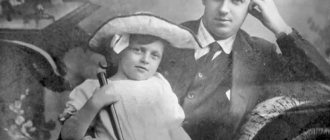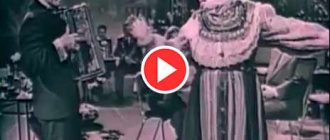Lydia Nikolaevna Kozlova is familiar to fans of Russian pop music primarily with the hit “Iceberg” performed by. Kozlova is also known as the widow of a famous songwriter.
Lydia Kozlova was born in November 1937 in the capital. The childhood years of the future poetess were scorched by the Great Patriotic War. After receiving her school certificate, Kozlova entered a construction college. When she graduated from the educational institution, she immediately went with the rest of the graduates to Saratov.
Young builders were supposed to build the Volzhskaya State District Power Plant. There, in Saratov, Lydia Kozlova met her future husband, Mikhail Tanich. A few years after the wedding, the young family was able to move closer to Moscow - to the town of Orekhovo-Zuevo.
Literature
The creative biography of Lydia Kozlova “bloomed” next to Mikhail Tanich. In her youth, the girl learned to play the guitar and sang well. She also wrote poetry. But after marriage, Kozlova’s amateur activity grew into a profession. Lydia wrote her first song based on her husband’s poetry. At that time she was 18 years old.
Writing has long attracted young Lydia Kozlova. She had something to tell her contemporaries about. She saw the tragedies of soldiers who returned crippled from the front. Many of them, armless and legless, did not want to return home and become a burden to their relatives. For such unfortunate people, homes for the disabled were created, where these people could live out their lives at state expense. Lidia Nikolaevna Kozlova wrote the story “Near the War” about such a house.
Then there came a long pause, lasting 20 years. One day Kozlova caught herself wanting to write poetry. She claims that the impetus was the creative atmosphere that reigned in the house thanks to her husband. Lidia Nikolaevna decided not to show her works to Mikhail Tanich.
Composition by Lydia Kozlova “Snowfall”
She gave the song “Snow is spinning, flying, flying” to the head of VIA “Plamya” Sergei Berezin, asking not to tell her husband who wrote the composition. After 2 days, Berezin reported that everyone liked the song. It was called “Snowfall” and became Lydia Kozlova’s first hit.
Soon Kozlova wrote compositions for songs that they also took into their repertoire. Mikhail Tanich, to whom singers and composers stood in line, sent some to his wife. He sent the young one to Kozlova. Thus was born the second hit called “Iceberg”. This is one of the best songs in the repertoire of the Russian pop diva Alla Pugacheva.
Soon, songs based on lyrics by Lydia Kozlova are sung by such pop stars as Edita Piekha, Lyudmila Gurchenko and. Kozlova often wrote her works in collaboration with composers whose names are familiar to everyone today. This is the already mentioned, Igor Azarov, and others.
Song based on lyrics by Lydia Kozlova “Iceberg” performed by Alla Pugacheva
When Mikhail Tanich died, Lydia Kozlova did not allow her husband’s favorite brainchild, the Lesopoval group, to disappear. She took up producing the group and became the artistic director of the group. Together with Kozlova, Lesopoval recorded several more albums.
After Tanich's death, Lydia Kozlova was finally accepted into the Russian Writers' Union. But the widow of the famous poet, despite her considerable achievements, considers herself, in comparison with her husband, “a first-grade student, diligently drawing out sticks.”
Today Lidia Nikolaevna continues to write poetry and produce a popular musical group. The poetess also puts in order the huge archive of Mikhail Tanich. Kozlova claims that the late songwriter still has many poems left for which wonderful songs will appear.
In December 2020, Lydia Kozlova became a guest of the “Alone with Everyone” program.
Biography
She began writing her first poems in her youth. Plays guitar.
Author of a number of popular songs, including: “Iceberg”, “Snow is Spinning”, “My Red Rose”, “Tumbleweed”. Her songs are performed by popular performers. Among them are Alla Pugacheva, Philip Kirkorov, Alexander Malinin, Nadezhda Chepraga, Valentina Tolkunova, Edita Piekha, Lyudmila Gurchenko and Vyacheslav Malezhik. Among the co-composers: Igor Nikolaev, Sergey Korzhukov, Igor Azarov, David Tukhmanov, Sergey Berezin, Vyacheslav Malezhik, Ruslan Gorobets, Anatoly Kalvarsky, Alexander Levshin, Alexander Fedorkov, Alexander Malinin, Mikhail Muromov, Irina Gribulina, Vadim Gamaliya and others.
Widow of the most popular songwriter Mikhail Isaevich Tanich (1923-2008)[1]. It is Lydia Nikolaevna who can be considered Mikhail Isaevich’s first co-author; she composed her first songs when she was 18 years old, writing music for his poems.
After the death of her husband, she became the producer and artistic director of the Lesopoval group.
Member of the Writers' Union of the Russian Federation
Personal life
The only love in Lydia Kozlova’s life was her husband Mikhail Tanich. The lovers lived together for 52 happy years. And few people know that in the first years of their life together the couple had to overcome incredible poverty and hardship. The couple walked the long and thorny path to fame hand in hand, managing not to lose their love. Before his death, Mikhail Tanich admitted to his wife that they “didn’t get enough of love,” despite the decades they had lived.
Lydia Kozlova turned out to be both a muse and a creator. This woman forced her husband to send his works to Moscow, where he read the poems and invited the poet from the Siberian province to the capital. At the same time, Lydia Nikolaevna managed to realize her talent, remaining in the shadow of her famous husband.
The personal life of Lydia Kozlova, according to the poetess, was happy. The woman claims that in her early youth she saw her future husband in a dream. And when I met her, I recognized her immediately. The marriage produced two daughters - Inga and Svetlana. At the request of their father, the girls did not connect their lives with music and singing.
The eldest daughter, Inga, had two children - Benjamin and Lev. Venya has already given his grandmother a great-grandson.
Later in an interview, the widow of the great poet shared that Tanich did not spoil his wife with compliments. And after a couple of decades of living together, he admitted that he considered his beloved beautiful. And only then did Lydia Nikolaevna come to terms with her appearance.
Once a journalist asked the poetess if there was a shortcoming that the author never forgave Mikhail Tanich. To which the woman replied that she had learned to love her husband, no matter what, and to forgive.
According to Kozlova, she is a happy person. The poetess never envied anyone. And she was not jealous of any woman about her beloved husband. Lydia Nikolaevna turned out to be a wise wife. Kozlova also didn’t like to complain. Lidia Nikolaevna simply understood that she was living with a great man. On the Internet you can find many joint photos of married couples.
Sometimes on the Internet you come across the question of what nationality Lidia Kozlova is. The famous poetess is Russian.
Childhood and youth
Lydia Kozlova was born in November 1937 in the capital. Her childhood years were scorched by the Great Patriotic War. After receiving her school certificate, Kozlova entered a construction college. When she graduated, she immediately went with the rest of the graduates to Saratov.
Lydia Kozlova in her youth
Young builders were supposed to build the Volzhskaya State District Power Plant. It was there, in Saratov, that Lydia Kozlova met her future husband, Mikhail Tanich. A few years after the wedding, the young family was able to move closer to Moscow - to the town of Orekhovo-Zuevo.
Dating singlesSingle women looking for serious relationships. Register and find a match! loveeto.ru Hide ad Hide ad: Not interested in this topic Product purchased or service found Violates the law or spam Interferes with viewing content Thank you, the ad is hidden.
Lidiya Kozlova now
In 2020, Lidiya Kozlova appeared as one of the judges in the first episode of the second season of the musical television show “Three Chords.”
Lidiya Kozlova as one of the judges in the TV show “Three Chords”
The essence of the competition program is that famous participants present to the jury a musical number based on a popular composition, performed in their own style. And the masters evaluate performances using a 4-point system. In May 2020, the third season of the TV show started. In the first and third editions, Lydia Kozlova was again present on the jury.
The permanent host of the program is.
Bibliography
- 1984 — “Iceberg”
- 1990 — “Tumbleweeds”
- 2000 — “My Red Rose”
- 2015 — “Fly, my dear”
Mikhail Tanich is the author of the words of such once famous hits as “Black Cat”, “Komarovo”, “Weather in the House”... His songs were heard in the films “We'll Live Until Monday”, “For Family Reasons”, “Take Care of Women” and many others . He also created the “Lesopoval” group and was its leader. Fate gave the poet 84 years. His heart stopped beating exactly ten years ago.
The widow of Mikhail Tanich, poetess Lydia Kozlova , spoke about the kind of person her husband was in an exclusive interview with FACTS.
(author of the lyrics of the popular songs “Iceberg” and “Snow is Spinning”).
— My husband’s family is from Ukraine,
- says Lydia Nikolaevna.
— His ancestors lived in Kiev and Lvov.
Misha’s grandfather was friends with Sholom Aleichem. When the writer went abroad, he left him his library. But during the pogroms it was burned... The husband himself at one time - before the war - studied at a Kharkov school and spoke Ukrainian quite well... He prepared very tasty borscht. You won't try this in any restaurant! He knew how to choose meat, tomatoes... He even dedicated a song to borscht - it was sung by the Lesopoval group. There are these words: “You can’t cook borscht without tomatoes, without seeds, without marrow. But the main recipe for aroma is different for everyone. I will treat my friends to borscht, heated over the fire, accompanied by a song, but the song should be just a seasoning for the borscht.” Borscht was his favorite dish. He also has a song about dumplings with cherries. He also cooked them well. And I always admired Kiev... - Is it true that several years before you met, you saw your future husband in a dream?
- More precisely, in a few months. I was 18 years old. I lived in the apartment of a 90-year-old woman. She treated me well and once said: “Do you want to see your future husband in a dream? Make a well out of matches and place them under your pillow.” I followed her advice and I dreamed of my life, in which there was a man with Tanich’s face. I saw him close up, like in a photograph. And six months later at the Volzhskaya State District Power Plant, where I was sent to work as a young specialist, Misha and I met at the company. I saw Tanich and said: “Oh, I know you!” He was surprised: where from? I answered: “I saw you in a dream!” True, for a long time—twenty or thirty years—he didn’t believe in it. He said: “Well, admit it: did you make this up?” But it was true.
- You have lived together for more than fifty years...
- And I was very happy with Misha! When the priest administered communion to his husband before his death, Misha suddenly turned to him: “Father, can you marry my wife and me?” The priest asked how many years we had been together, and, raising his hand, said: “Well, you are already married THERE! So don't worry."
* Lydia Kozlova: “I was very happy with Misha”
— What gift from your husband is especially close to your heart?
“I didn’t think about gifts, we were so poor when we were young.” When they got married, they had neither furniture nor dishes. There wasn't even a bed! At first we slept on the floor. Someone advised my husband to go to... the morgue, they say, they were throwing out discarded beds there. He chose one and we slept on it for several years. There was no blanket or pillow. Misha brought from the editorial office two meters of paper on which newspapers are printed, wrote “carpet” in pencil and attached it to the wall in the summer kitchen where we lived with four buttons. And then a daughter was born, and we moved to Stalingrad.
— Is it true that you dedicated your famous song “Iceberg” to your husband?
- This is a legend. Of course, all poetry is nourished by the past or the present, but it is always modified. You should never think that a work of art is written about a specific person.
— I read that this song was created when you were on the verge of divorce.
- No, we have never reached such a border. Although I was much younger than Misha, I understood that reproaches do not strengthen a marriage. I never expressed anything, and I think he appreciated that in me. And Misha has never said a single rude word to me in his entire life. Dying, when he no longer got out of bed, the husband composed some poetry every day. After his death, I found a piece of paper, and on it: “I will sing you a secret bedtime song, this lullaby of mine. The dream touches the eyelashes, the stars in the distance... Fall asleep, beauty, on my hand. And if you wake up, show up, I’m no longer sleeping. Suddenly you show up and I already love you.” And even before he died, he said: “You don’t even know what a faithful husband I was to you.”
— Mikhail Tanich suffered terrible trials...
- Unthinkable! But he never despaired.
— Did you believe in fate?
- Even more. After all, they told him about me too! Misha was then sixteen years old. He decided to buy himself an eight-piece cap. I went to the market. And there I met a young gypsy woman. She invited him to tell fortunes. He said that he had no money, to which the gypsy replied: “And I’ll tell you fortunes for free.” She took his hand, looked and exclaimed: “Oh, and you will have a life! And your wife will be called Lida.” And so it happened. Although Misha didn’t believe it then, because he didn’t know a single girl with that name.
— Have miracles happened in your husband’s life?
- What more! He was almost buried in a mass grave. All the guys in the dugout died. He alone remained alive, although he was severely shell-shocked. Fortunately, one of the soldiers noticed that his cheek twitched. Misha was sent to the hospital. There he came to his senses for three months, since after the concussion he could not hear or see. And as soon as I recovered, I went back to the front line. My husband found himself on the brink of life and death more than once. He said that at the front, when bullets were flying in his direction, he said: “Lord, bring it through!” And not a single one hit him. Misha was a believer.
— Why was Mikhail Tanich sent to a camp for six years?
— I got there through a denunciation. He returned from the front and entered the architectural institute. And since he fought in Latvia, Lithuania, Poland, he reached Berlin and told the company that Europe has wonderful roads and very good radios. One of the students reported on him: they say that Mishka praised life abroad, thereby denigrating life in the Soviet Union. And Tanich was sent to logging. There he froze his legs and almost died.
— Did your husband feel fame?
— When the Lesopoval group appeared, we could not go outside. I remember, we were walking, and a drunk man came towards us. He is wobbly, but he is clearly moving straight towards us. I, as a cautious woman, thought: now he will start a scandal, or a fight, or ask for money. And he comes up to his husband and says: “Uncle Misha, what a happy man I am! Today is my birthday - and I met you!” I think Tanich was very pleased that people liked his songs.
—What character trait of your husband struck you most?
- Cheerfulness and wit. He could see many situations in a slightly ironic light, he knew how to laugh easily and play up the situation to make everyone happy. For example, there is a joke that Tanich came up with. On their birthday they wish one person: “Live 120 years!” And he answered: “No, no, I want 119 - then they will write on the monument: “He left untimely.” Now this joke is considered popular. There were many things that struck me about Misha. He started learning English when he was already over 80. This was before our trip to America. Misha studied German at school, so he had to learn English from scratch. And when we arrived in the USA, within three days I began to speak it.
In general, Misha traveled to many countries. And I traveled with him. I remember how in 1971 we went to England. We walked around London. Of course, we also approached Buckingham Palace. Suddenly the police started pushing everyone back. And Tanich, as he stood at the gate, remained so. I was afraid that he would be taken to the police. Suddenly the gate opens and a Rolls-Royce slowly drives out. And there is a queen in it. And suddenly Tanich walks towards the car and blows a kiss to the queen. She smiles and sends him a response, like a good friend... Misha was a very sociable person.
* The fate of Mikhail Tanich was full of miracles
— What kind of person was Mikhail Isaevich in everyday life? How did you dress? What was his favorite dish?
— He dressed well, with taste, but that was not the main thing for him. As for food, he cooked perfectly - right down to the Napoleon cake. And he diligently taught me everything.
— Did he have a hobby?
— I loved sports. From the age of three he played football.
— Do your daughters also write poetry?
— Both are artists. The eldest left with her husband and children for Holland, and they stayed there.
— Do you have your husband’s favorite song?
- I love everything. But the most favorite ones are “The White Light Came Like a Wedge on You”, “Seeing Off Love”, “Mirror”, “White Swan on the Pond”...
— What did Mikhail Tanich die from?
“He had a terrible heart condition.” At 78 years old he had bypass surgery. And kidney failure was also discovered due to cancer. And before that there was so much! In the camp he suffered from tuberculosis, his legs were frozen - they wanted to cut them off. But Misha said: “If you cut them off for me, I won’t leave the camp. I’ll stay here.” He had been disabled since 1942, but he never moaned. Never!
— Do you dream about your husband?
“He comes in my dreams all the time and supports me.”
-What would you say to your husband if he could hear you?
- I would say: “I love you!”
Lydia Nikolaevna Kozlova. Born on November 19, 1937 in Moscow. Soviet and Russian poetess, songwriter, artistic director of the Lesopoval group (since 2008). Wife of songwriter Mikhail Tanich.
My childhood years were during the war.
From her youth she loved poetry, composed it herself and set it to music. She knew how to play the guitar and had a good voice. She often performed songs in companies and amateur performances.
After graduating from school, she entered a construction technical school, after which she was assigned to Saratov for the construction of the Volzhskaya State District Power Plant.
In 1953, in one of the newspapers, she read a poem by Mikhail Tanich, which she liked, and she decided to set the poem to music. She came up with a song. And three years later she was able to meet the author of the lines himself, who became her husband.
Since the husband served time in prison, he was not allowed into the capital. They lived in Svetly Yar, then moved closer to Moscow - to the town of Orekhovo-Zuevo.
I wrote the story “Next to the War” - about what I myself saw during the war. The work tells about the tragedy of soldiers who returned crippled from the front. Many of them, armless and legless, did not want to return home and become a burden to their relatives. For such unfortunate people, homes for the disabled were created, where these people could live out their lives at state expense.
When I was young, I was seriously ill; doctors suspected cancer. Lydia Kozlova said: “I developed leukemia. This was in those years when life was very difficult for us - both financially and in everyday life. I walked around all white. Hemoglobin was such that one already dies. But I didn’t know that. She just said: “Misha, I can’t walk anymore.” He took me to the writers' hospital. There was a very good chief physician there, Professor Giller, a German by nationality. This doctor walks down the corridor and sees me, all white, barely moving my legs. Turns to the nurse: “Take her blood test.” When they brought the result, he commanded: “Run to the hospital!” She could die at any second." They took me away, immediately gave me a lot of blood transfusion, and I spent two and a half months there. Fortunately, I recovered."
Being a housewife for a famous songwriter, for a long time she did not dare to write poetry. But the creative atmosphere that reigned in their home thanks to her husband nevertheless encouraged Lydia to return to her favorite pastime. But Lydia was afraid to show her works to Mikhail Tanich. She gave the song “Snow is spinning, flying, flying” to the head of VIA “Plamya” Sergei Berezin, asking not to tell her husband who wrote it. After 2 days, Berezin reported that everyone liked the song. It was called “Snowfall” and became Lydia Kozlova’s first hit.
She recalled: “I didn’t show my poems to my husband for two or three years - I was ashamed. But when I had a whole manuscript, I decided: it’s time, otherwise Misha will think that this is treason - he writes and hides it. You can imagine his shock! Silently he took the notebook and went into the office. I sat there for a long time. He came out and said: “You know, not bad. You reminded me of Akhmatova.” And he no longer stuttered either word or deed to somehow help or teach. He said: “If you have it in you, you’ll learn it yourself.”
The most famous song for which she became the author of the lyrics is the composition “Iceberg”
in performance.
Her songs were (are) performed by many popular performers. In addition to Alla Pugacheva, these are Philip Kirkorov, Alexander Malinin, Nadezhda Chepraga, Valentina Tolkunova, Edita Piekha, Lyudmila Gurchenko and Vyacheslav Malezhik. Among the co-composers: Igor Nikolaev, Sergey Korzhukov, Igor Azarov, David Tukhmanov, Sergey Berezin, Vyacheslav Malezhik, Ruslan Gorobets, Anatoly Kalvarsky, Alexander Levshin, Alexander Fedorkov, Alexander Malinin, Mikhail Muromov, Irina Gribulina, Vadim Gamaliya and others.
Twice she became a laureate of the “Song of the Year” festival: in 1984 with the song “Iceberg” (music by Igor Nikolaev) performed by Alla Pugacheva and in 2000 with the song “My Red Rose” (music by Sergei Korzhukov) performed by.
After the death of her husband, since 2008 she has been the producer and artistic director of the Lesopoval
.
Lidia Nikolaevna not only continues to write poetry and produce a famous musical group, but also puts in order the huge archive of Mikhail Tanich: the late songwriter left a lot of poems for which wonderful songs appear.
In 2020, Lidiya Kozlova appeared as one of the judges in the first episode of the second season of the musical television show “Three Chords.” In 2018, she was on the jury of the third season of this TV show.
Lidiya Kozlova - Alone with everyone
Personal life of Lydia Kozlova:
Husband - (1923-2008), Soviet and Russian songwriter, People's Artist of the Russian Federation.
Lydia first learned about Tanich from a publication - in 1953 she read his poems and set them to music: “Don’t expect advice from me and don’t expect a hint from me, I myself got lost somewhere, like Ivan the Fool from a fairy tale ..."
We met in Saratov at a friendly party in 1956. A relationship began between them, and soon they decided to get married. For a long time they lived very poorly. She recalled: “For a little over a year we lived in Svetly Yar, where Tanich worked as a correspondent, there I gave birth to a daughter... We spent fifteen years in poverty, nothing happened, but we loved each other and were happy. I remember Mikhail Isaevich received the first author’s 240 rubles! And with them I bought a wooden folding bed and a huge black radio, like a coffin, at a thrift store.”
The marriage produced two daughters - Svetlana Mikhailovna Kozlova and Inga Mikhailovna Kozlova. The daughters took their mother's surname so as not to be in the shadow of their famous father.
Inga gave her grandchildren Lev and Veniamin. Svetlana has never been married, lives in her parents’ apartment and works on her father’s archive.
As the potess recalled, Tanich confessed his love to her only in old age: “When he was young, he didn’t say such words to me. Mikhail Isaevich did not spoil me with compliments. For example, because of this, I could not come to terms with my appearance for a long time. All the women seemed more beautiful, smarter, slimmer, more practical. Only after living with me for decades, Misha said: “Do you know how beautiful you are? There is some kind of amazing harmony in you, I would even say animal. Either you look like a fox, or like a wolf. And if you make your features more correct, it will no longer be true.” This is how the poet explained it to me. And only then did I accept my appearance.”
“A month after Tanich’s death, I went into his office and saw on the table a sheet of poetry with the inscription “Lide.” I realized that Mikhail Isaevich dedicated them to me, and we made a song,” said Lydia Kozlova.
Discography of Lydia Kozlova:
1990 - “Tumbleweeds” - Songs based on lyrics by Lydia Kozlova 2020 - “Fly, my dear” - Songs based on lyrics by Lydia Kozlova
Songs by Lydia Kozlova:
“Iceberg” - (Music by Igor Nikolaev) - Spanish. Alla Pugacheva, Olga Zarubina and Igor Nikolaev, Lolita Milyavskaya “Amulet” - (Music by Hassan Bogocharov) - Spanish. Hasan Bogocharov “Amulet” - (Music by Sergei Korzhukov) - Spanish. group “Lesopoval”, Galina Besedina, Valentina Ponomareva “Anna Karenina” - (Music by Olga Stelmakh) - Spanish. Olga Stelmakh “Twins” - (Music by Vyacheslav Malezhik) - Spanish. Vyacheslav Malezhik “Blues of a Fallen Star” - (Music by Sergei Korzhukov) - Spanish. Sergey Korzhukov “In that country” - (Music by Vladimir Kuklin) - Spanish. Ekaterina Surzhikova “Vanka Cain” - (Music by Sergei Korzhukov) - Spanish. Artem Korzhukov “Take my heart” - (Music by Sergei Muravyov) - Spanish. Alisa Mon “Looking at the World” - (Music by Vladimir Kuklin) - Spanish. Ekaterina Surzhikova “Ice” - (Music by Evgeny Shchekalev) - Spanish. Ksenia Georgiadi “Horizon” - (Music by Sergei Muravyov) - Spanish. Alisa Mon “Rain” - (Music by Tles Kazhgaliev) - Spanish. Galina Nevara “I’ll wait, I’ll wait” - (Music by Alexander Fedorkov) - Spanish. Efim Shifrin “Living Water” - (Music by Sergei Muravyov) - Spanish. Alisa Mon “The Golden Mean” - (Music by Sergei Muravyov) - Spanish. Alisa Mon “Illusion” - (Music by Dmitry Morozov) - Spanish. Gyulli Chokheli “What a pity” - (Music by Sergei Korzhukov) - Spanish. Artem Korzhukov, Sergey Korzhukov, Valentina Ponomareva “What a pity” - (Music by Igor Nikolaev) - Spanish. Lyudmila Gurchenko “Fireplace” - (Music by Gaia Galitskaya) - Spanish. Gaya Galitskaya “Cowboy” - (Music by Evgeny Golovin) - Spanish. Evgeny Golovin “Kupavna” - (Music by Gaia Galitskaya) - Spanish. Gaya Galitskaya “Fly, love” - (Music by Vadim Gamaliya) - Spanish. Birute Petrikite “Fly, my dear” - (Music by Ruslan Gorobets) - Spanish. Olga Zarubina “Summer in September” - (Music by Vladimir Kuklin) - Spanish. Dina Rychkova “Mirages” - (Music by Sergei Korzhukov) - Spanish. Sergey Korzhukov “I don’t need others” - (Music by L. Osipov) - Spanish. VIA “Lada” “My heart is free” - (Music by Vladimir Kuklin) - Spanish. Ekaterina Surzhikova “Mozart” - (Music by Vyacheslav Malezhik) - Spanish. Vyacheslav Malezhik “You and I are at the threshold” - (Music by Sergei Korzhukov) - Spanish. Sergey Korzhukov “Don’t repeat it” - (Music by Anatoly Kalvarsky) - Spanish. Mikhail Boyarsky, Larisa Dolina “Awkward conversation” - (Music by Igor Nikolaev) - Spanish. Alexander Malinin “Awkward conversation” - (Music by Alexander Fedorkov) - Spanish. Efim Shifrin and Galina Bazarkina “I promise” - (Music by Sergei Muravyov) - Spanish. Alisa Mon “Autumn” - (Music by Dina Rychkova) - Spanish. Dina Rychkova and Gyulli Chokheli “Open Look” - (Music by Alexander Levshin) - Spanish. Evgeny Golovin “Feel, guess, call” - (Music by Igor Nikolaev) - Spanish. — Edita Piekha “Tumbleweeds” — (Music by Sergei Korzhukov (pseudonym Alexander Lunev) — Spanish Nadezhda Chepraga, Sergey Korzhukov “Seeing Off” — (Music by Irina Gribulina) — Spanish Valentina Tolkunova “Farewell” — (Music by Sergey Muravyov) — Spanish Alice Mon “Bird - blue wing” - (Music by Mikhail Muromov) - Spanish Mikhail Muromov and Olga Zarubina “Pugachev” - (Music by Alexander Malinin) - Spanish Alexander Malinin “Five minutes to the train” - (Music by Olga Stelmakh) - Spanish Olga Stelmakh "Separation" - (Music by Sergei Korzhukov) - Spanish Sergei Korzhukov "River-Summer" - (Music by Sergei Korzhukov) - Spanish Sergey Korzhukov "My Red Rose" - (Music by Sergei Korzhukov) - Spanish Philip Kirkorov, Yaroslav Evdokimov, Sergey Korzhukov “The rowan tree shook its branches” - (Music by Irina Gribulina) - Spanish ensemble "Dubrava" "Blue Wave" - (Music by Sergei Berezin) - Spanish VIA "Plamya" "Violin" - (Music by Alexander Fedorkov ) - Spanish Efim Shifrin “Violin, violin, play” - (Music by Sergei Muravyov) - Spanish Alisa Mon “The snow is spinning” - (Music by Sergei Berezin) - Spanish VIA “Plamya”, Lev Leshchenko, Alsou, Valery Obodzinsky, group “Bi-2”, group “Chuk and Gek” “Warm me” - (Music by Sergei Muravyov) - Spanish. Alisa Mon “The Sun at its Zenith” - (Music by Michel Raiko) - Spanish. Natalya Stupishina (Anka) “Judgment Day” - (Music by Michel Raiko) - Spanish. Natalya Stupishina (Anka) “Dance floor” - (Music by Sergei Korzhukov) - Spanish. Alena Apina “Your words” - (Music by Sergei Muravyov) - Spanish. Alisa Mon “You give me so much in life” (Music by Andrei Kosinsky) - Spanish. Alena Apina “Wilted Flowers” - (Music by Sergei Korzhukov) - Spanish. group “Lesopoval”, Nadezhda Chepraga, Philip Kirkorov “Black River” - (Music by Gaya Galitskaya) - Spanish. Gaya Galitskaya “It only seems” - (Music by Igor Azarov) - Spanish. Igor Azarov “It only seems” - (Music by David Tukhmanov) - Spanish. Valentina Tolkunova “This Evening” - (Music by Igor Nikolaev) - Spanish. Edita Piekha “I’m worried” - (Music by Sergei Muravyov) - Spanish. Alisa Mon “I’m waiting for you” - (Music by Vladimir Kuklin) - Spanish. Vladimir Kuklin “Apple” - (Music Olga Stelmakh) - Spanish. Olga Stelmakh
Their meeting was destined by fate. Lydia Kozlova first saw him in a dream. A gypsy told Mikhail Tanich about it. They recognized each other at first sight, and then lived together for 52 years. Together we went through poverty, lack of recognition, and fame. And they never ceased to thank God for the meeting with each other.
“I invented you for myself...”
She studied at a technical school in Stalingrad and rented an old sofa in the basement of an ancient grandmother. It was the hostess who told Lydia how to see her betrothed in a dream. And Lydia saw, she even had time to examine his beauty.
After technical school, Lydia did not go to Moscow, where she was sent, but asked to go to the Stalingrad Hydroelectric Power Station. She worked at a construction site and lived in a dormitory. And on November 7, 1956, the same man from her girlish dream came to their party. When she was asked to sing, she lightly touched the strings of the guitar and began to sing the song for which she wrote the music herself, having read the poems of Tanich, unknown to her, in the local newspaper. And he whispered in her ear: “Tanich is me!” He later said that a gypsy woman he met at the market once said that his wife would be called Lydia.
That evening, the two of them sat at the table for a long time, and she kept moving away from him, embarrassed and timid. Before this meeting, she had never even gone to the cinema with anyone. He seemed incredibly mature to her, he was 13 years older, he went through the entire war, and then ended up in the camps, serving 6 years allegedly for anti-Soviet propaganda. In fact, he just talked about good roads in Germany. During his imprisonment, his first wife filed for divorce.
After meeting Lydia, Mikhail quit his job at the construction site and moved to a small town. He was finally given a job that matched his qualifications. He wrote letters to her. Touching, full of warmth and tenderness.
Lydia lived by these letters and her love for an adult, wise man. When he asked her to come, she immediately quit the construction site and went to meet her love.
“I’ll be a wife, but I won’t get married!”
They got married when their eldest daughter, Inga, was born. Lydia lived with him, loved him immensely, but refused to register the relationship. She realized how talented the person was next to her. He's been through a lot. And young Lydia did not know whether this adult man would be faithful to her.
Already at the age of 18, this fragile girl, looking like a teenager, talked about freedom in love. She believed that a poet should not be limited by lack of freedom. She invited him to mature before marriage with her.
Only after eight years of marriage did they understand: it was impossible to live without each other. And they signed urgently to get a small janitor’s apartment, which Lydia literally begged from the Komsomol Central Committee. By that time they were already living in Zheleznodorozhny: Mikhail Tanich, his wife and their two daughters, Inga and Svetlana. Later, only thanks to Lydia Nikolaevna they will receive Moscow registration.
JAPANESE HAND
– Do you really think that the songs of “Lesopoval” have a beneficial effect on people from the criminal world?
– You know, Tanich and I were once sitting in a restaurant. The waiter approaches: “Mikhail Isaevich, here Vyacheslav Kirillovich wants to come up to you.” It was thief in law Vyacheslav Ivankov, nicknamed Yaponchik - he had just returned from an American prison.
Small, neat, very well dressed. He says: “Mikhail Isaevich, I came to say thank you. When I was in prison, they brought me your “logging” songs. I don't know how I would survive without them. I listened to them and thought: how many stupid things I would not have done in my life if I had become acquainted with your work earlier.” And he extends his hand to Tanich. Tanich is sitting. I begin to twitch: how is it possible, a man, one might say, has opened his soul and is extending his hand!
Finally, Tanich also extended his hand to him, but somehow disrespectfully, across his back, like a priest who offers his hand for a kiss. I see that this Jap understands the duality of the situation: he stands and is silent. I think: well, that’s it, he’s not alone here, now his lads will get involved - and... But he still shakes Tanich’s hand, says: “All the best,” turns and leaves.
And then I come in: “Aren’t you ashamed? How could you give your hand like that?! Whatever the criminal may be! He came to you as if he were a god...” Tanich covered his face with his hands, then said: “Yes, he was better brought up than me...”
– Has Mikhail Isaevich encountered betrayal in his life? Could you forgive?
– I’ll tell you one case. A few years before Tanich left, the man who, after the war, wrote a slander against him began to call him: “Forgive me, Misha, for God’s sake!” The old man suddenly repented. I heard this conversation.
Tanich: “I don’t know why you did this, but I can’t forgive you, only God can.” And after this call, about a month later, this man flew on a corn farm and crashed. “You see how God always grades us,” Tanich told me. “There will be retribution for every low action.”
- What a character! But so do you. Is it true that it was only thanks to you that the family was able to live in Moscow?
- Here is how it was. We lived in a bad apartment in the Moscow region: a 9-meter room in a private house and a small extension made of planks - like a summer kitchen, and in it there was a stove. When they heated it, they opened the door to the room because there was no stove there. Tanich developed tuberculosis, still in the camp, and so did his eldest daughter. I still run, I don’t know that I have blood cancer. There was water from the ceiling, basins everywhere. I realized: we need to do something before we all die here.
I went to the Komsomol Central Committee. Three guys are sitting there in the office. I told them about our life. They called the secretary of the district executive committee: “Do you have any free housing? Tanich has terrible conditions here.” - “There is one janitor’s room, will it do?” They ask me: “Are you going to the janitor’s room?” - "Certainly!" - “That’s it, go to the district executive committee.” Let's go...
But Mikhail Isaevich and I were not registered, although we already had two children. So they pointed this out to me: “Bring the marriage document, then you will get a warrant.” I jump out and run to Tanich: “Let’s go register urgently! They give us an apartment." At the registry office, Tanich already had to persuade the employees to sign us up urgently.
I go out happy and open my passports. He has a “marriage with L.N. Kozlova”, I have a “marriage with L.N. Kozlova”. Guard! And it’s already 6 o’clock in the evening, they close the registry office! We go back: “Girls, please!..” They cross them out and write: “believe the corrected one.”
I run to the district executive committee again. I take out my passport and show it. They gasped because they couldn’t imagine that I could do all this in a few hours.
Union of two hearts
Mikhail Tanich himself never asked for anything. Lydia was entirely in charge of negotiations with officials. For three years she was afraid to admit to him that she also wrote poetry. When she had filled a whole thick notebook with poems, Lydia handed it to her stunned husband. He didn’t even know about her work. After reading it, he expressed his complete approval to her.
They both wrote real hits. He had “Black Cat”, “A song goes round and round”, “I’ll get off at a distant station”, “Love is a ring”, “I look at you like in a mirror”, “A soldier is walking through the city”, “Take me with you” ", "Farewell to Love", "Komarovo", "Weather in the House" and more than 1000 songs. But she also had her hits: “Iceberg”, “My Red Rose”, “Snow is Spinning”, “Tumbleweeds”.
Lidia Nikolaevna always insisted that she and Tanich could not be put on the same level: he is a genius. And Mikhail Isaevich himself spoke about his wife: “I met an amazing person - both in intelligence and character... She is my happiness. I myself am not worth anything, I just got a win in life - my Lida.”
Lidia Nikolaevna spent 10 years persuading her husband to create the Lesopoval group. This group is still incredibly popular. Mikhail Tanich wrote his songs for them and in almost every one there was his own pain and his experience. However, as a child, Lydia Nikolaevna also spent several years in a row communicating with prisoners who were actually taken to the Invalides Home to die. She lived across the street and was curious what kind of people they were. So she ran to this house from the age of 4 to 13.
Discography[ | ]
- 1990 - “Tumbleweeds” - Songs based on lyrics by Lydia Kozlova Nadezhda Chepraga - Tumbleweeds (A. Lunev (S. Korzhukov))
- Larisa Dolina - Don't repeat it (A. Kalvarsky)
- Vladimir Kuklin - I'm waiting for you (V. Kuklin)
- Gaya Galitskaya - Kupavna (G. Galitskaya)
- Alisa Mon - I'm worried (S. Muravyov)
- Alla Pugacheva - Iceberg (I. Nikolaev)
- Alisa Mon - Warm me (S. Muravyov)
- Gaya Galitskaya - Black River (G. Galitskaya)
- Ensemble “Flame” - Snow is spinning (S. Berezin)
- Gaya Galitskaya - Fireplace (G. Galitskaya)
- Nadezhda Chepraga - Tumbleweed (music by S. Korzhukov)
Didn't like it enough...
Mikhail Isaevich was seriously ill for a long time. The cancer progressed and gradually ate him from the inside. But he was never capricious or complained. And she believed that together they would overcome all diseases, they could. I believed until the very last moment. Shortly before his death they got married. Mikhail Tanich left on April 17, 2008, whispering goodbye that they never fell in love...
He left her a legacy of “Lesopoval”, of which she is now the artistic director. And lines full of love, found by her after his departure:
Who would know how beautiful you are in the morning, how your makeup doesn’t suit you, how the two suns of your green eyes rise above me every time. Who would have known and who would have seen? Yes, anyone. He should wake up with you. Who would know how beautiful you are - you yourself. Well, I would go crazy with jealousy...
Their family happiness was real, they lived for 52 whole years without having time to talk enough or look at each other enough. The history of family life is a conflict between the real and the sublime, between everyday life and dreams, and the spiritual abyss that inevitably follows.











